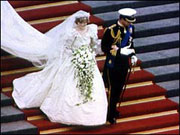 |
| The train of Diana's dress was 25 ft long |
| 1981: Charles and Diana marry |
England have
Crowds of 600,000 people filled the streets of London to catch a glimpse of Prince Charles and Lady Diana Spencer on their wedding day.
The couple were married at St Paul's Cathedral before an invited congregation of 3,500 and an estimated global TV audience of 750 million - making it the most popular programme ever broadcast.
Britons enjoyed a national holiday to mark the occasion.
Lady Diana, 20, arrived almost on time for the 1120 BST ceremony after making the journey from Clarence House in the Glass Coach with her father, Earl Spencer.
She made the three-and-a-half minute walk up the red-carpeted aisle with thesumptuous25 ft (7.62 m) train of her Emmanuel designed, ivory taffeta and antique lace gown flowing behind her.
Archbishop of Canterbury Dr Robert Runcie led the traditional Church of England service, but he was assisted by clergymen from many denominations.
The bride's nerves showed briefly when she mixed up the Prince's names - calling him Philip Charles Arthur George, rather than Charles Philip.
Charles, 32, in the full dress uniform of a naval commander, slightly muddled his vows too, referring to "thy goods" rather than "my worldly goods".
After a brief private signing ceremony the Prince and Princess of Wales walked back down the aisle to the refrain of Elgar's Pomp and Circumstance.
Balcony embrace
The newlyweds took the open-topped state landau to Buckingham Palace where they emerged on the balcony at 1310 BST to give the crowds the kiss they had been longing to see.
Afterwards Charles and Diana retired from the public gaze to enjoy toasts and a wedding breakfast with 120 family guests.
A "just married" sign attached to the landau by Princes Andrew and Edward raised smiles as the married couple were driven over Westminster Bridge to get the train to Romsey in Hampshire to begin their honeymoon.
|